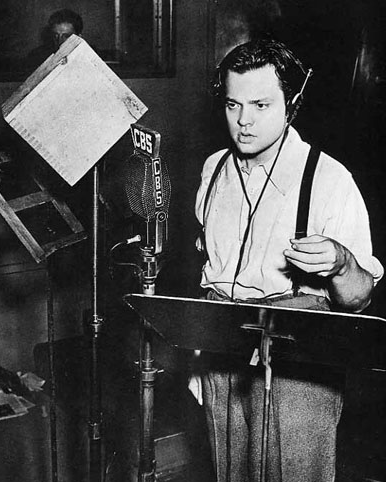Wires to the Sky
 Friday, March 21, 2008 at 10:00AM
Friday, March 21, 2008 at 10:00AM 
In 1938, Orson Welles altered radio forever. Welles produced and acted in one of the most famous broadcasts in the history of the medium War of the Worlds. Radio was a relatively new technology although by 1936 over ninety-eight percent of the British population and over sixty percent of Americans had radios in their homes. Welles played a trick on his audience. He used the authority of a newscaster to fabricate a first-person account of the landing of invaders from Mars on earth.
In 1965, the filmmaker, Peter Watkins did the same thing with his film The War Game. Although it was supposed to be shown on BBC television, the film never made it to air. There were fears that it would overwhelm viewers and frighten them. Watkins used many of the same techniques that Welles had developed for radio except the topic this time was a nuclear holocaust and its aftermath shot in cinema-vérité style. In both instances, the outcry was enormous. The primary effect of these productions was to foreground the impact of media on our culture, identity and sense of history. In Welles’s case, the police actually came to the studio to try to stop the broadcast.
The bridge between truth and fiction was crossed many times by Welles and Watkins who deliberately highlighted and took advantage of the weaknesses and the strengths of mass media. Most importantly, both artists used images and sounds to flout the conventions of communication that had quickly become standardized within the broadcast and film industries. Watkins spent his career exploring a style of self-reflexive documentary that in recent times has been taken up by music videos, television, and Hollywood films. Perhaps the most blatant example of this is The Blair Witch Project, which owes a great deal to Watkins’s film Culloden made in 1964. In both these cases, hand-held cameras were as important as Welles’s voice in overriding the fictional elements of the narrative with the sensation that the story was true.
As both Welles and Watkins understood, there is a wonderful, albeit contradictory fragility in our relations with images and sounds. Our culture is also in the midst of a profound transition as we negotiate our way through the maze of human, social and economic relations that digital technologies are generating. I see this process of transition as an opportunity to reinvigorate our relationship with the tools provided by communications technologies.
Transitional periods like the one we are living through at the moment, allow us to develop new models that will facilitate our understanding of why the invention and development of new technologies continues to be one of the most important activities of Western culture. This, despite the fact that new technologies don't necessarily lead to positive change. The design and use of any new technology is never inevitably bound to the outcomes that were anticipated by its creators, something that the recently deceased author Arthur C. Clarke understood really well.
Why are our identities so bound up with the media technologies that surround us? Ironically, the cultural and social tendency in the discussion of new technologies is to talk about what has been lost. My own approach is to cautiously explore what has been gained.
Instead of seeing the future through dystopic eyes, a future more defined by machines and media than by humans, I want to suggest that the technologies of communication we have created are not just tools or supports for human endeavors. Rather, in tandem with our growth as a civilization, communications-based technologies have always been a part of the ecology of human existence. This is not meant to downplay the legitimate fears that many people have about computers for example, and their possible dominance in the affairs of humans. I do not want to dilute worries about living within simulated spaces and losing contact with reality.
On the other hand, all new technologies have to varying degrees been the means through which Western culture has defined everything from religion to politics to culture. We are very good at building ecological spaces based on images and sounds. The advent of digital media is just one additional phase in a long history of development that has its roots in music, performance and a variety of cultural forms that are dependent on spectators, participation, and presentational technologies.


